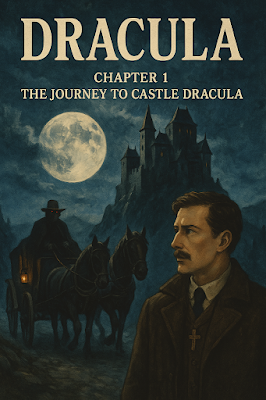🧛 Dracula – Chapter 1: The Journey to Castle Dracula
Jonathan Harker’s Journal – May 3rd
I left England on the last day of April and have now arrived in Transylvania. My journey has been long and strange. The people here speak many different languages. I try to smile and be polite, but I often feel like an outsider.
The countryside is beautiful—wide rivers, thick forests, and tall mountains. The air smells of pine trees and earth. But as I get closer to my destination, people become quieter.
When I told the innkeeper I was going to Castle Dracula, his eyes widened. His wife crossed herself and muttered a prayer. They begged me not to go. “The castle is cursed,” they whispered.
I tried to laugh it off. “I have business with Count Dracula. He is expecting me.”
That night, an old woman gave me a silver crucifix. “For your protection,” she said.
May 4th
At midnight, a black carriage arrived to take me to the castle. The driver wore a long cloak and had red eyes. He didn’t speak, only pointed. I climbed in.
The horses raced through the darkness. The forest seemed to close in around us. Wolves howled in the distance.
I felt cold, though I wore my thickest coat.
Suddenly, I saw a blue flame burning beside the road. The driver stopped, climbed down, and disappeared. When he returned, we continued.
This happened several times. Each time, the same blue flame. Each time, silence.
At last, we reached the castle.
It stood tall against the mountains, dark and sharp, like a black shadow in the sky. The great wooden door opened silently, and Count Dracula stood there.
He was pale, with sharp features and dark hair. His hands were cold and strong.
“Welcome to my home, Mr. Harker,” he said with a smile.
His voice was calm and polite. But something in his eyes made me uneasy.
We entered the castle. The halls were lit with candlelight, but no mirrors. The air smelled like dust and stone.
The Count showed me to my room. It was comfortable but cold. The windows were barred. The door had no lock on the inside.
As he left, he said, “Sleep well. Tomorrow, we will talk about your work.”
But I didn’t sleep well at all.
📖 Glossary
| Word / Phrase | Meaning |
|---|---|
| Outsider | A person who does not feel part of a place or group |
| Cursed | Believed to be under a bad magic or spell |
| Crucifix | A Christian cross, often worn as protection |
| Barred | Covered with metal bars to stop entry or escape |
| Uneasy | Worried, nervous, or uncomfortable |
❓ Comprehension Questions
-
Where is Jonathan Harker traveling?
-
How do the local people react to his destination?
-
What gift does the old woman give him?
-
What is strange about the carriage journey?
-
What does Castle Dracula look like?
-
How does the Count appear when he greets Jonathan?
-
Why does Jonathan feel uneasy in the castle?
✅ Answers
-
He is traveling to Castle Dracula in Transylvania.
-
They are frightened and beg him not to go.
-
A silver crucifix.
-
The driver stops at blue flames and never speaks.
-
Dark, tall, and sharp—like a shadow in the sky.
-
Pale, polite, but with something strange in his eyes.
-
The castle feels cold and locked; there are no mirrors, and the Count seems mysterious.






